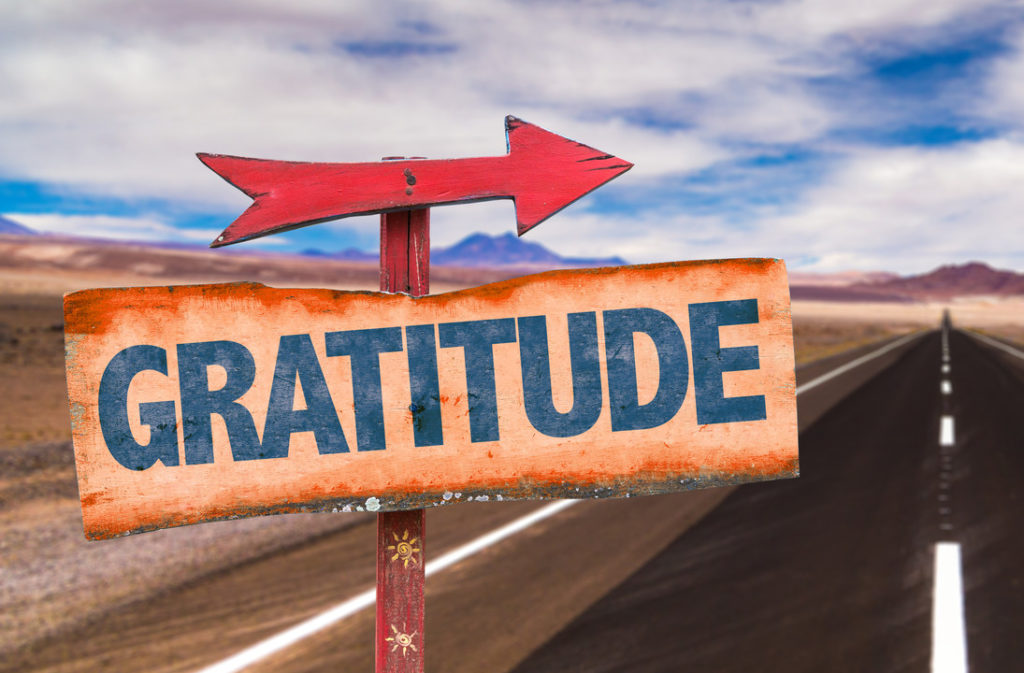Harness Gratitude to Stop Career Burnout & Activate Your Full Potential

Want to stop career burnout? Try a dose of gratitude. Recent research has shown that gratitude makes you happier and healthier. One of the world’s leading experts on the science of gratitude, Psychology Professor Dr. Robert Emmons of the University of California, Davis, found that gratitude is related to 23 percent lower levels of stress hormones (cortisol), a 10 percent improvement in sleep quality in patients with chronic pain and led to a 7-percent reduction in biomarkers of inflammation in patients with congestive heart failure. His research also found that activities like keeping a gratitude journal or writing letters of thanks helped people reduce dietary fat intake by as much as 25 percent and reduced the risk of depression in at-risk patients by 41 percent over a six-month period.
Fantastic, right? Being grateful clearly does wonderful things for your wellness and well-being. But what if you could harness this practice to do more, like fulfill your amazing potential in life? I propose that gratitude is one of the best sources of fuel – sustainable, easy to create on-demand and talk about a low carbon footprint – in helping you unleash your inner rock star. As a Certified Professional Co-Active Coach, I developed this daily Gratitude Rocket Fuel exercise in 2014 for clients to use in getting clear about their current circumstances, build a swell of positive energy by focusing on what they are grateful for, and then focus intently on several items they’d like to claim. Like metaphorical rocket fuel, it acts as an explosive charge taking individuals to new heights of success and fulfillment.
Hey, I’m all about drinking my own Kool-Aid (minus the powdered sugary stuff, so perhaps it’s about gulping down my own water if I’m being literal). Today I use this exercise every morning to power my multi-hyphenate roles as the Chief Communications Officer at a $2 billion corporation, motivational speaker, author and wellness enthusiast. You can begin your morning with this exercise to frame the time ahead, or do it before bedtime to reflect on what’s been accomplished. Best of all, you can see results from investing as little as 15 minutes in stoking your Gratitude Rocket Fuel supply each day. Ready to get started? Here are the five steps to take:
- Create. Open a new Word document on your laptop, the notes screen on your phone or take out a blank piece of paper and pen. Take in a deep breath and exhale. Stop paying attention to whatever else is around – especially smart devices and technology – and focus intently on the page ahead.
- Consider. What is your current circumstance? How do you feel that day, and why? Make your initial responses simple, like “I feel rested and happy from getting enough sleep, ready to tackle the day” or “I’m frustrated, because I overate from stress and didn’t take good care of myself.” Expand on that for a bit in answering the why behind it.
- Acknowledge. Think about what you did for yourself during the previous day, or in the case of a night time practice, the day you just completed. List whatever comes to your mind, making sure you have at least one item. This step is about expressing gratitude to yourself.
- List. Make a list of everything and everyone you are grateful for at that moment, and the longer the better. Seeing all the goodness in your life helps attract more. For example, I just celebrated my fifth wedding anniversary. So, my list this weekend included “loving husband,” “happy marriage,” “nice anniversary dinner out,” instead of just the milestone itself.
- Claim. Review your gratitude list, letting each mention sink in. If time isn’t a concern, really savor every element you named. Then pick a couple of action steps or behaviors you claim for that day, drawing upon your that lovely buzz of gratitude rocket fuel. Make your claim items specific and achievable.
Harnessing gratitude brings you a whole heap of benefits. It’s good for your physical health, relationships with others and overall well-being. Instituting a daily gratitude practice like this can help you avoid burnout, thrive at work and home and claim the life you deserve.
What are you grateful for? How has an attitude of gratitude impacted your career?
